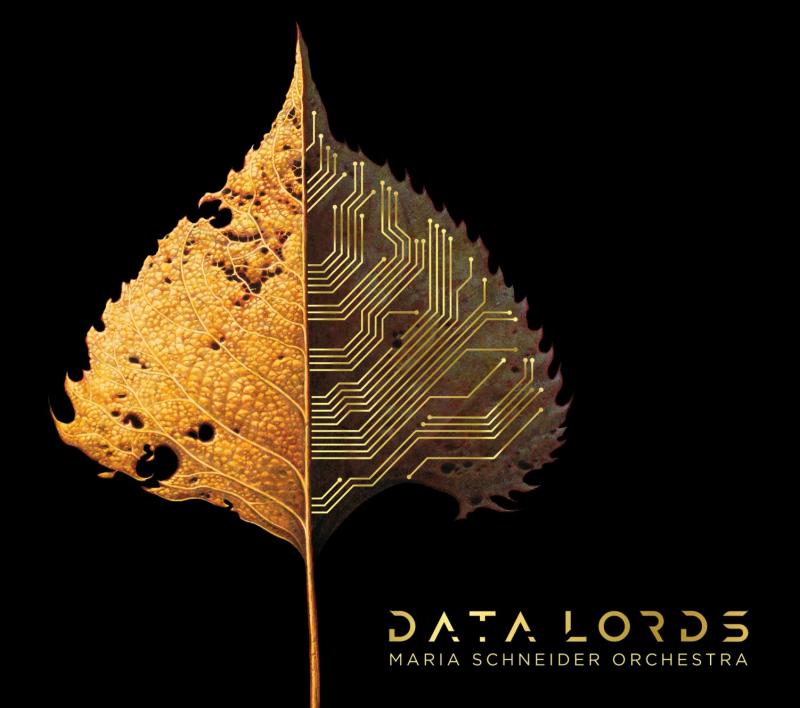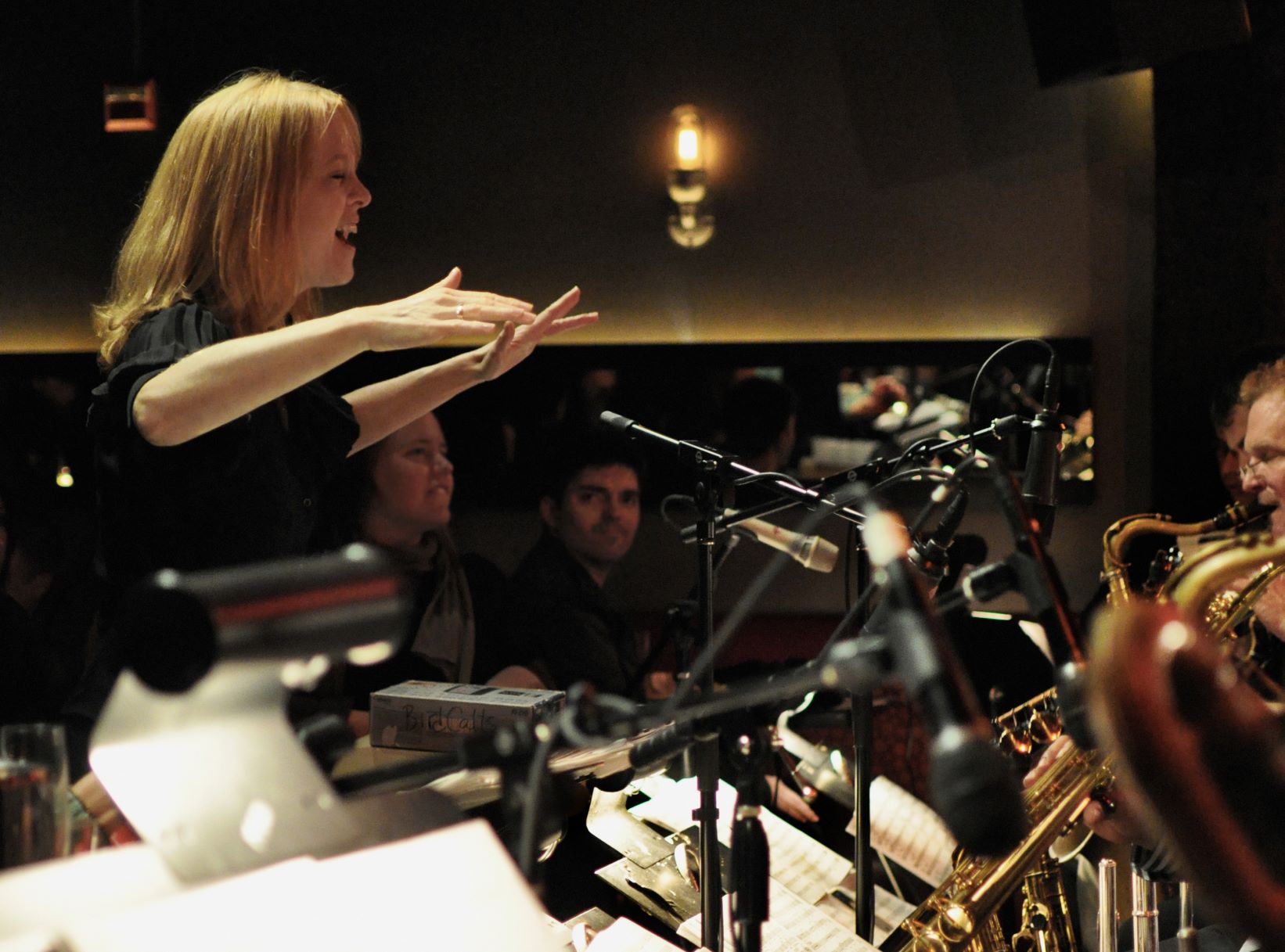Album: Maria Schneider Orchestra – Data Lords | reviews, news & interviews
Album: Maria Schneider Orchestra – Data Lords
Album: Maria Schneider Orchestra – Data Lords
A great double album inhabiting two worlds

It is five years since Maria Schneider’s The Thompson Fields was released – and hailed as a masterpiece – so this new two-disc set has been eagerly awaited. It doesn’t disappoint. Data Lords is a major piece of work. This “story of two worlds” as the album’s strap-line has it, is two contrasting albums which inhabit very different emotional territory.
The first of the two is entitled The Digital World. For many years, Maria Schneider has been an assiduous, forthright and highly articulate defender of the rights of creators in the face of the land-grab by the data companies. It is a subject on which she has testified in front of the US’s Congressional Subcommittee on Intellectual Property. “Musicians have been the canary in the coal mine,” she says. “We were the first to be used and traded for data.” This is a very deeply held and life-long conviction for Schneider. Her father was an inventor employed by the Kimberly-Clark corporation, so the company owned every single one of his inventions. “So I was very aware” she has said, “of what it meant for a man to create something and have pride in his inventions. I grew up with that.”
What is unusual in this album is that these convictions don’t just determine the means of distribution of the music – it is available exclusively via mariaschneider.com – but they find their way into the very fabric of the music itself. The message, the rancour, the sense of injustice are deeply embedded in every moment of the first album. And yet Schneider’s craft and judgment are such that music in the eerie, dystopian world has the marvellous feeling for structure, pacing and often sheer beauty that listeners who know Schneider’s music will be expecting.
The slow-paced “Sputnik” imagining satellites orbiting the earth is portentous, Parsifal-like, and has a sense of coming from somewhere very deep and dark. “Don’t Be Evil”, taking Google's former motto, is mocking like an acerbic Kurt Weill tango. It starts with snarling muted trumpets, and has a curiously, wilfully oblique ending. And when the last track, “Data Lords” finally loses momentum and seems to fall exhausted into a chaotic heap, one has the sense that every sound, every detail, every last cheep and blip has earned its place.

The second disc Our Natural World is a complete contrast. It is epic, glorious. Schneider (photo above by Dina Regine) has said of her Minnesota upbringing that “ I always thought I came from a special place...Maybe all that space makes you fill it in with your mind.” And devotees of Schneider’s work can go straight to tracks like “Braided Together” and “Bluebird” where they recognize all of the poise, poetry and divine sense of pacing that they know well.
There are instrumental glories throughout this album, but the work of the low brass both as section and as individuals is quite unbelievable and is caught exceptionally well on the recording. Whereas Strauss (or was it Stravinsky?) once said “don’t look at the trombones, it only encourages them", I had the sense that Maria Schneider must keep looking at the trombones a lot. And they certainly deliver here.
After three complete listens, this is an album which, it feels, is only just starting to reveal its two-fold essence. The album, released today, will deservedly be at or near the top of the jazz year-end lists Thoroughly recommended.
The future of Arts Journalism
You can stop theartsdesk.com closing!
We urgently need financing to survive. Our fundraising drive has thus far raised £49,000 but we need to reach £100,000 or we will be forced to close. Please contribute here: https://gofund.me/c3f6033d
And if you can forward this information to anyone who might assist, we’d be grateful.

Subscribe to theartsdesk.com
Thank you for continuing to read our work on theartsdesk.com. For unlimited access to every article in its entirety, including our archive of more than 15,000 pieces, we're asking for £5 per month or £40 per year. We feel it's a very good deal, and hope you do too.
To take a subscription now simply click here.
And if you're looking for that extra gift for a friend or family member, why not treat them to a theartsdesk.com gift subscription?
more New music
 Album: Solar Eyes - Live Freaky! Die Freaky!
Psychedelic indie dance music with a twinkle in its eye
Album: Solar Eyes - Live Freaky! Die Freaky!
Psychedelic indie dance music with a twinkle in its eye
 Album: Night Tapes - portals//polarities
Estonian-voiced, London-based electro-popsters debut album marks them as one to watch for
Album: Night Tapes - portals//polarities
Estonian-voiced, London-based electro-popsters debut album marks them as one to watch for
 Album: Mulatu Astatke - Mulatu Plays Mulatu
An album full of life, coinciding with a 'farewell tour'
Album: Mulatu Astatke - Mulatu Plays Mulatu
An album full of life, coinciding with a 'farewell tour'
 Music Reissues Weekly: Sly and the Family Stone - The First Family: Live At Winchester Cathedral 1967
Must-have, first-ever release of the earliest document of the legendary soul outfit
Music Reissues Weekly: Sly and the Family Stone - The First Family: Live At Winchester Cathedral 1967
Must-have, first-ever release of the earliest document of the legendary soul outfit
 Album: Robert Plant - Saving Grace
Mellow delight from former Zep lead
Album: Robert Plant - Saving Grace
Mellow delight from former Zep lead
 Brìghde Chaimbeul, Round Chapel review - enchantment in East London
Inscrutable purveyor of experimental Celtic music summons creepiness and intensity
Brìghde Chaimbeul, Round Chapel review - enchantment in East London
Inscrutable purveyor of experimental Celtic music summons creepiness and intensity
 Album: NewDad - Altar
The hard-gigging trio yearns for old Ireland – and blasts music biz exploitation
Album: NewDad - Altar
The hard-gigging trio yearns for old Ireland – and blasts music biz exploitation
 First Person: Musician ALA.NI on how thoughts of empire and reparation influenced a song
She usually sings about affairs of the heart - 'TIEF' is different, explains the star
First Person: Musician ALA.NI on how thoughts of empire and reparation influenced a song
She usually sings about affairs of the heart - 'TIEF' is different, explains the star
 Album: The Divine Comedy - Rainy Sunday Afternoon
Neil Hannon takes stock, and the result will certainly keep his existing crowd happy
Album: The Divine Comedy - Rainy Sunday Afternoon
Neil Hannon takes stock, and the result will certainly keep his existing crowd happy
 Music Reissues Weekly: Robyn - Robyn 20th-Anniversary Edition
Landmark Swedish pop album hits shops one more time
Music Reissues Weekly: Robyn - Robyn 20th-Anniversary Edition
Landmark Swedish pop album hits shops one more time
 Album: Twenty One Pilots - Breach
Ohio mainstream superstar duo wrap up their 10 year narrative
Album: Twenty One Pilots - Breach
Ohio mainstream superstar duo wrap up their 10 year narrative
 Album: Ed Sheeran - Play
A mound of ear displeasure to add to the global superstar's already gigantic stockpile
Album: Ed Sheeran - Play
A mound of ear displeasure to add to the global superstar's already gigantic stockpile

Add comment